Key takeaways:
- Managing time effectively is crucial; techniques like the Pomodoro Technique and setting self-imposed deadlines can enhance focus and accountability.
- Recognizing the emotional journey of solo projects helps maintain motivation; celebrating small victories can combat feelings of isolation and self-doubt.
- Creating a support network through online forums or collaboration tools is essential for sharing ideas and gaining motivation.
- Reflecting on lessons learned, such as the importance of flexibility and self-compassion, can transform challenges into opportunities for growth.
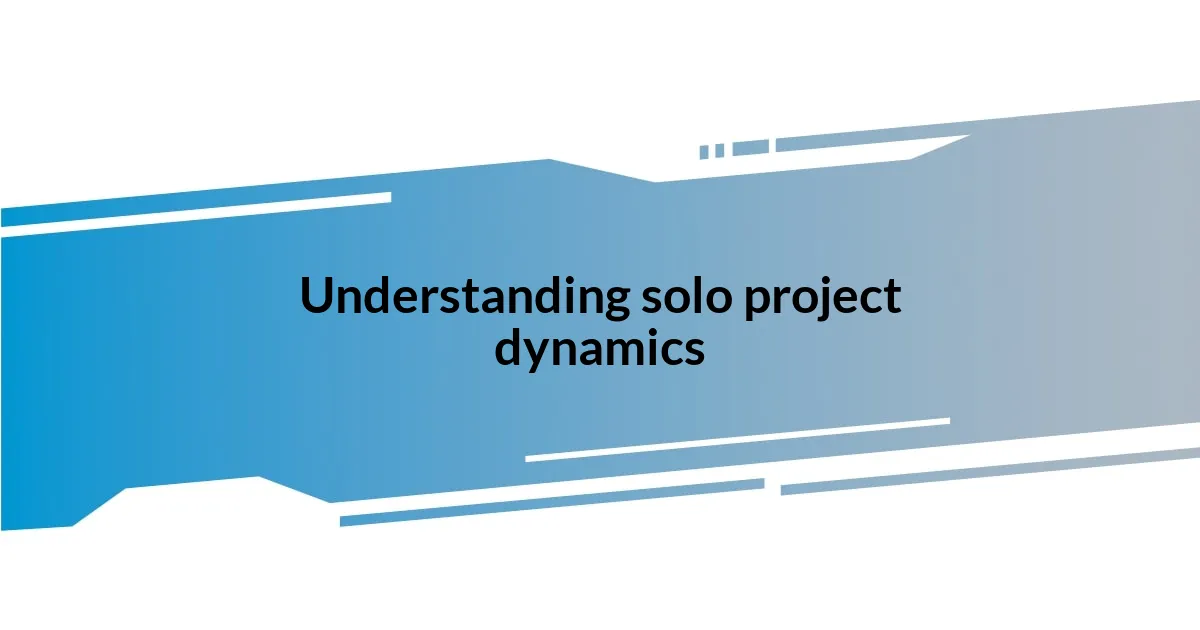
Understanding solo project dynamics
Understanding the dynamics of solo projects often feels like a balancing act. I remember my first solo venture; it was exhilarating yet daunting, and I found myself constantly shifting between the joy of creation and the weight of responsibility. Have you ever felt that tug-of-war between inspiration and self-doubt?
A critical aspect is managing your time effectively. I once lost track of a project deadline because I was so engrossed in the creative process that I neglected the other operational aspects. It was a wake-up call for me, highlighting how easily passion can cloud crucial logistics. How do you prioritize your tasks when you’re engrossed in the fun parts?
Lastly, it’s essential to recognize the emotional journey involved. There are moments of triumph when everything clicks into place, but there can also be frustrating instances of stagnation. I’ve learned to celebrate small victories, understanding that progress isn’t always linear. How do you keep your motivation alive when faced with challenges? Sharing these ups and downs with others—whether through discussion or simply reflecting—can provide unexpected support.
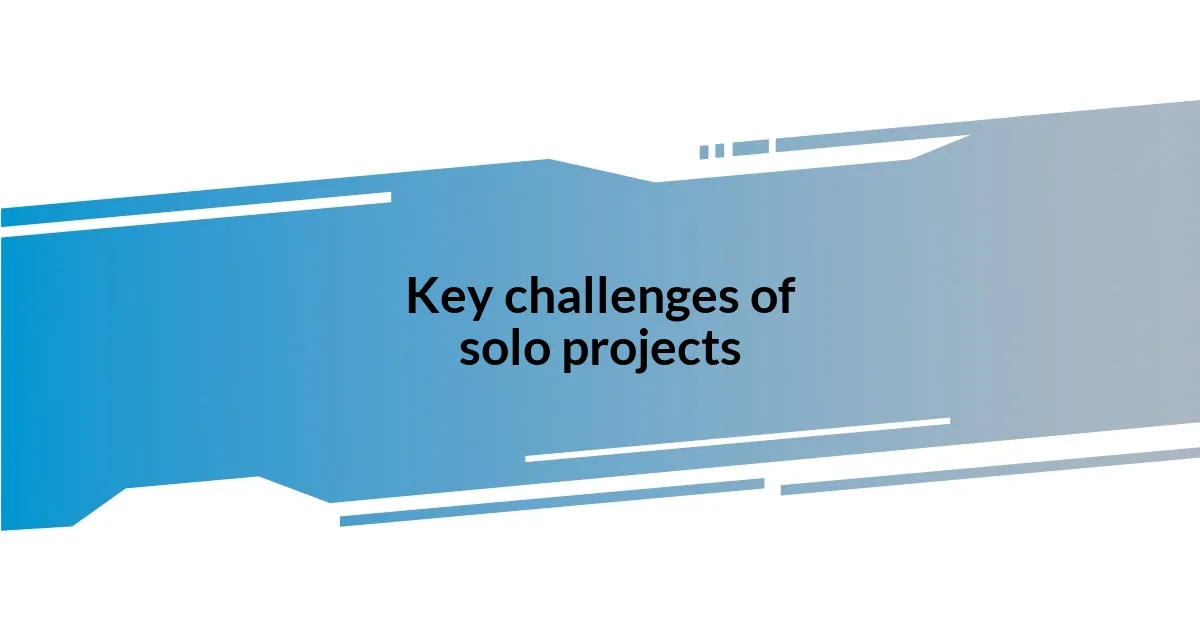
Key challenges of solo projects
When diving into solo projects, one of the key challenges I often face is the overwhelming feeling of isolation. I remember working late into the night on my first project, and while the quiet allowed for creativity, it also fostered a sense of loneliness that crept in like an unwelcome guest. Not having a team to bounce ideas off or share frustrations with can make the journey feel like an uphill battle.
Here are some common challenges I’ve encountered:
– Decision fatigue: Every choice rests on your shoulders, which can be exhausting.
– Accountability: It’s easy to slip into procrastination without someone to hold you accountable.
– Skill gaps: You may find that you lack expertise in certain areas, which can slow progress.
– Emotional rollercoaster: The highs of success can quickly be followed by lows of self-doubt, making it hard to maintain motivation.
– Work-life balance: Establishing boundaries between your project and personal life is tough when you’re so invested.
Managing these hurdles takes time, and I’ve learned to create a support system, whether through online forums or local meetups. This connection is crucial; it helps keep the loneliness at bay and fuels motivation. When I’m stuck, simply sharing my hurdles with others can rekindle my passion and provide new perspectives.
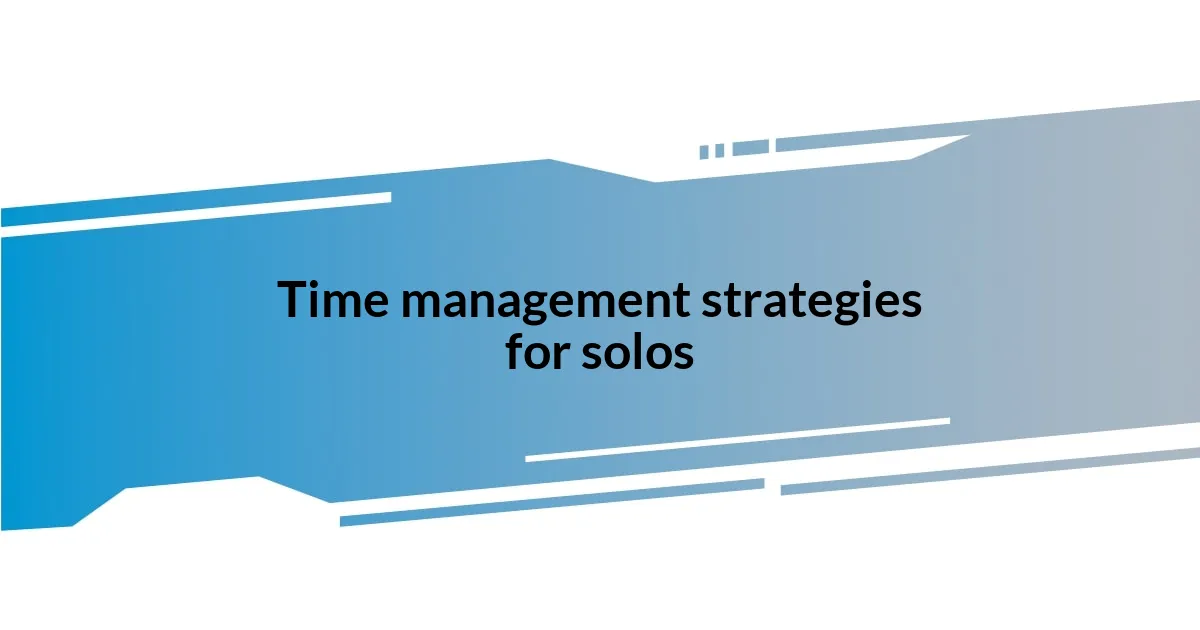
Time management strategies for solos
It’s amazing how small changes in routine can transform your productivity. One time, after struggling with time management on a project, I decided to implement the Pomodoro Technique. This strategy involves working for 25 minutes, followed by a 5-minute break. I found that breaking my time into manageable chunks allowed me to maintain focus without feeling overwhelmed. Have you ever tried working in short bursts? It can be surprisingly effective!
Another invaluable strategy is setting clear deadlines, even for flexible projects. During one particularly ambitious solo endeavor, I marked specific dates for milestones. This helped me stay on track and infused urgency into my work. I noticed that without deadlines, my pace tended to slow down, and I’d lose focus. How do you motivate yourself when there’s no strict timeline? I’ve discovered that embracing self-imposed deadlines sparks a sense of accountability that keeps me moving forward.
Lastly, I can’t emphasize enough the importance of prioritization. I’ve often found myself juggling multiple tasks, leading to overwhelm. To manage this, I adopted a simple method: listing my tasks by urgency and importance. Often, the tasks I initially thought were critical were not as impactful as focusing on long-term benefits. Have you experienced a moment where shifting your focus made all the difference? It’s enlightening to see how clarity can lighten the load on solo projects.
| Strategy | Description |
|---|---|
| Pomodoro Technique | Work in focused bursts followed by breaks to maintain concentration. |
| Self-Imposed Deadlines | Creating deadlines for yourself to enhance accountability and progress. |
| Task Prioritization | List tasks based on their urgency and importance to maintain focus. |
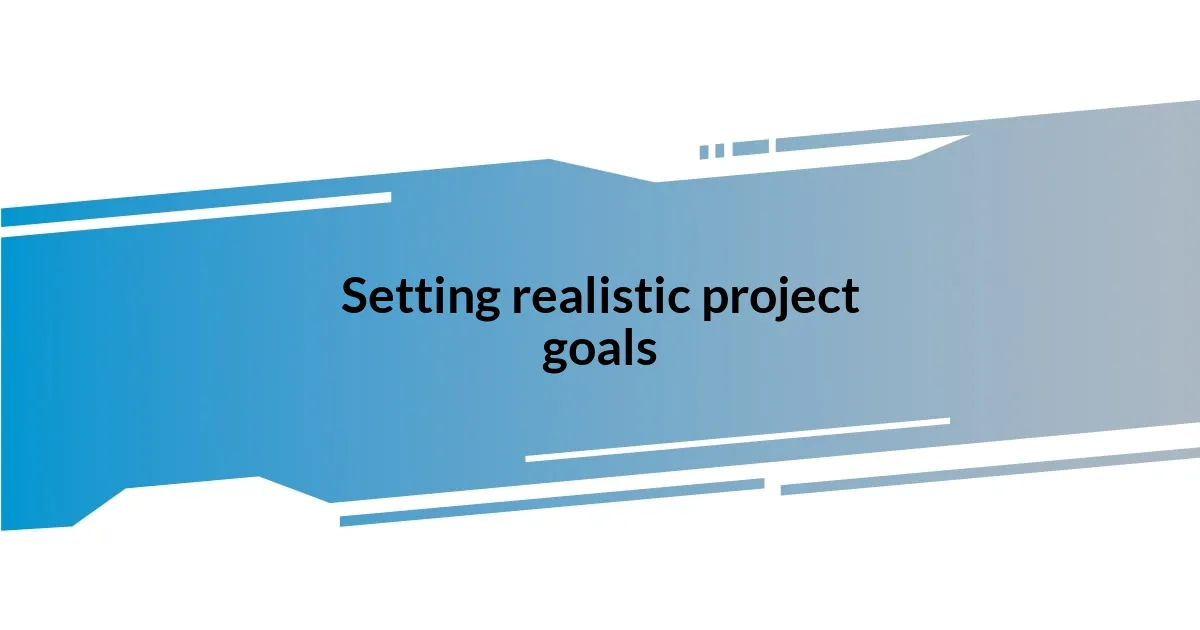
Setting realistic project goals
Setting realistic project goals can feel daunting, but I’ve learned the importance of breaking down my ambitions into smaller, achievable steps. For instance, during a project I was passionate about, I initially aimed to complete everything in a few weeks. After experiencing frustration and burnout, I realized that setting intermediate milestones made a world of difference. Isn’t it easier to celebrate small victories rather than feel overwhelmed by an immense goal?
I also find that aligning goals with my current skills and available time is crucial. There was a time when I set lofty objectives without considering my other commitments. I ended up feeling stretched thin and unable to deliver quality work. By honestly assessing what I could realistically accomplish, I not only enhanced my focus but also provided myself with the space to grow. Have you ever set a goal that turned out to be too ambitious? Recognizing those limits helps prevent disillusionment down the road.
Moreover, involving others in my goal-setting process has proven beneficial as well. I once shared my project aims with a friend, and their feedback reshaped my perspectives. This collaborative approach instills a sense of accountability and makes the entire endeavor feel less isolating. So, have you thought about discussing your ambitions with someone? Sometimes, just a simple conversation can ignite the spark needed to refine your objectives and fuel your motivation.
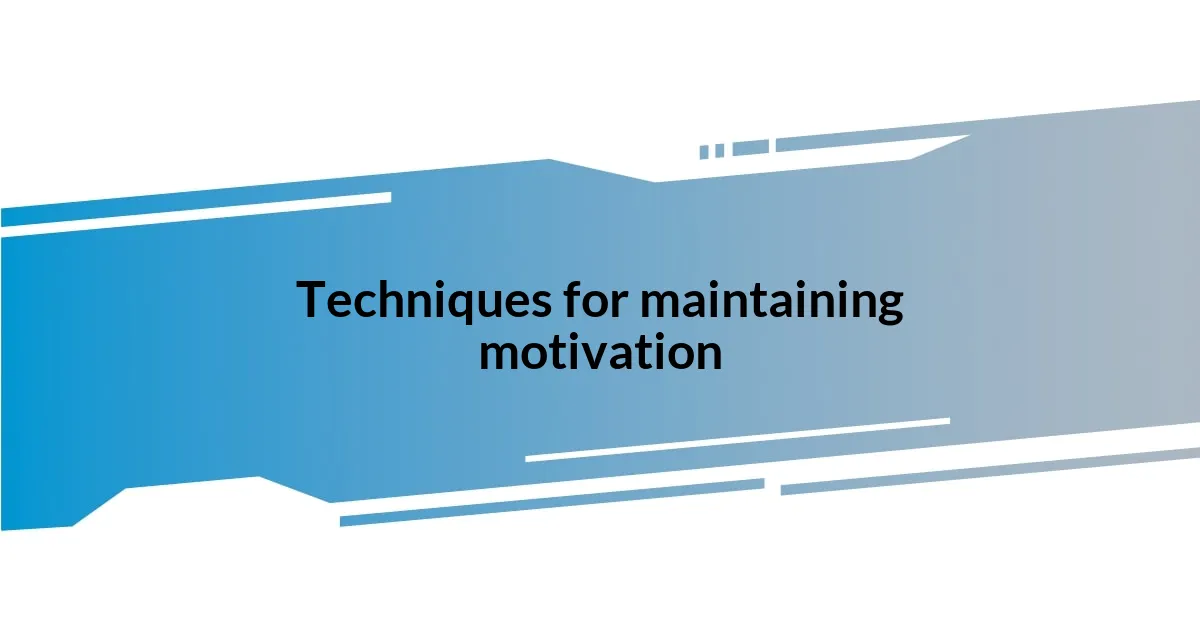
Techniques for maintaining motivation
One technique that has worked wonders for me in maintaining motivation is creating a visual progress tracker. I remember when I embarked on a challenging solo project; I designed a colorful chart that outlined each step. As I checked off tasks, I felt a surge of accomplishment. Have you ever created something visual that spurred you on? It’s remarkable how seeing your progress can ignite motivation and foster a sense of achievement.
Another approach I often use is incorporating rewards into my workflow. For instance, during particularly tough stretches of work, I’d promise myself a simple treat, like a favorite snack or a short episode of a show, once I completed a task. This small incentive worked like magic. Do you respond better to rewards? I’ve found that having something to look forward to can transform daunting tasks into manageable challenges, boosting my drive to push through.
Lastly, I can’t overlook the power of reinforcing my “why.” On days when motivation wanes, I reflect on the reasons I started my project in the first place. There was a time I let distractions pull me off track, but reconnecting with my vision reignited my commitment. Have you taken a moment to remind yourself of your purpose lately? A little introspection can make a profound difference, providing clarity and revitalizing your passion for your work.
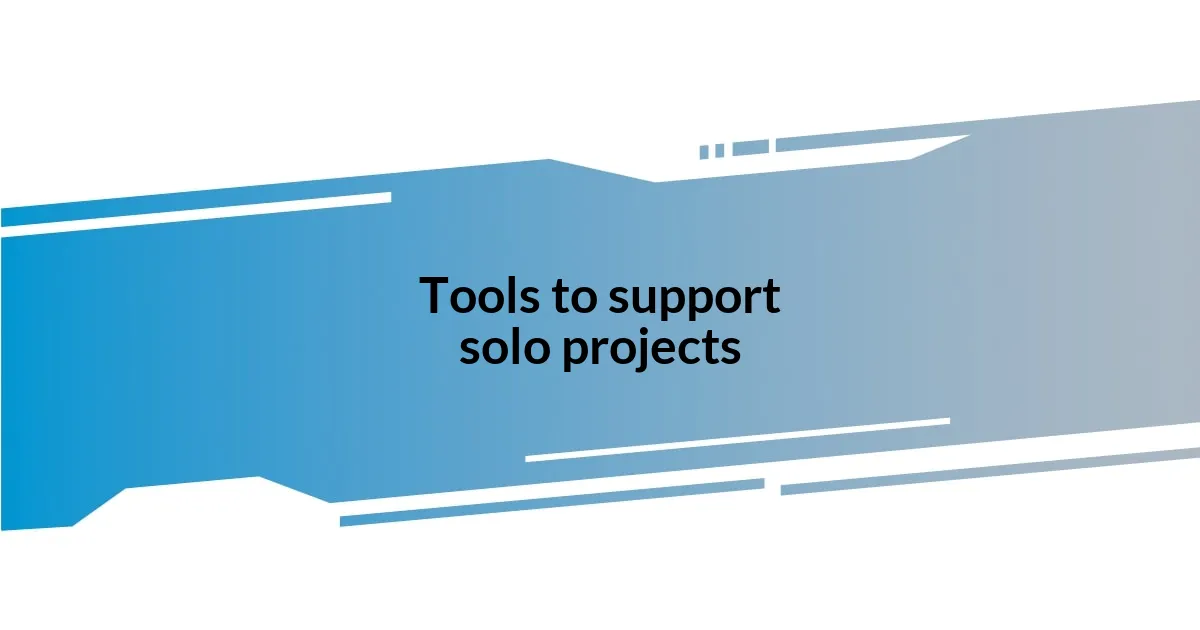
Tools to support solo projects
One of my favorite tools for supporting solo projects is Trello. This intuitive board system helps me visualize all my tasks and ideas in one place. I remember when I first started using it; seeing my tasks laid out so clearly made planning a breeze. Have you ever felt overwhelmed by all the little details? Trello turns chaos into manageable lists, which can be so refreshing.
I also can’t emphasize enough the importance of Google Docs for collaboration, even in solo projects. While I work alone, I often use it to jot down ideas and brainstorm. The real-time editing feature allows me to rapidly develop concepts, and I’ve even shared my documents with friends for insights. It’s surprising how much a fresh set of eyes can elevate my work. Have you considered how feedback might enhance your creative process?
Lastly, I’ve come to rely on apps like Focus@Will, which provides background music designed to improve concentration. When I first dabbled into intense focus sessions, the right tunes turned my workspace into a haven of productivity. It’s incredible what a difference the right environment makes; have you thought about how your surroundings affect your focus? For me, these tools create a structure that supports my solo ventures and fosters creativity.
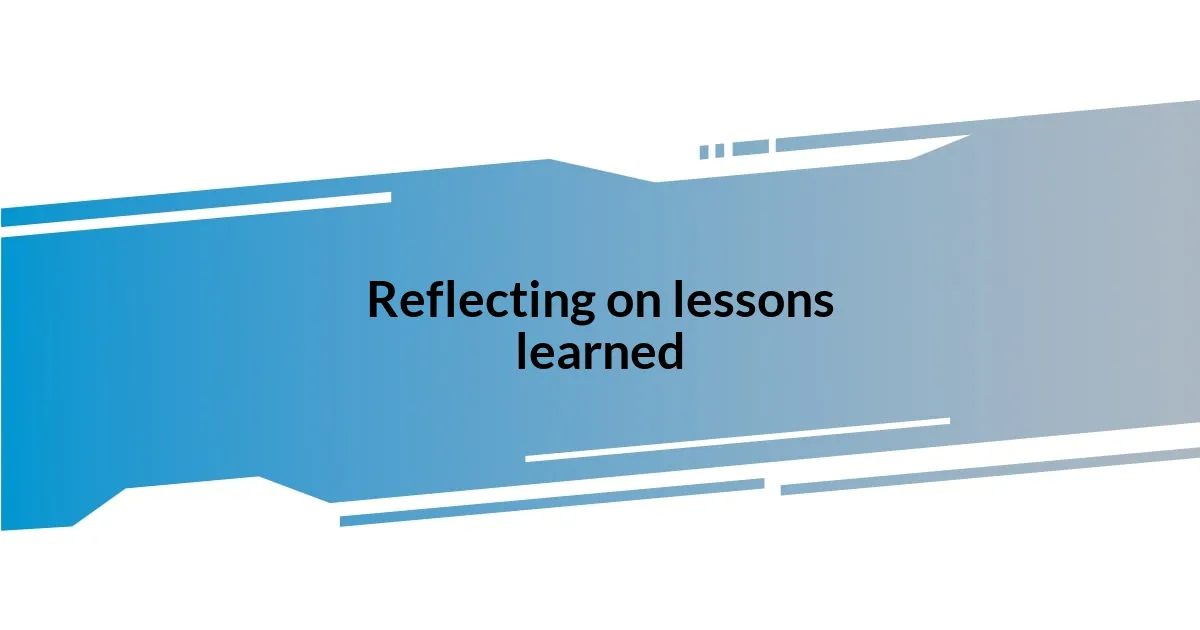
Reflecting on lessons learned
Reflecting on my journey balancing solo projects has illuminated some crucial lessons. I remember one particular project where I underestimated the time I needed. I had planned everything meticulously, but life threw curveballs. The stress I felt taught me to prioritize flexibility in my timelines. How have your plans changed unexpectedly, and what did you learn from it? Embracing uncertainty has since become a guiding principle in my work.
Another significant takeaway for me has been the importance of self-compassion. There were moments when I felt frustrated by my progress, often comparing myself to others. I had to remind myself that each person’s journey is unique. Have you ever felt that pressure? In those low moments, I learned to celebrate small victories instead, which helped me maintain a positive mindset and keep moving forward.
Lastly, engaging with a community, even as a solo worker, has profoundly impacted my experience. During a particularly draining project, I reached out for support, joining an online forum of like-minded individuals. The encouragement I received and the exchange of ideas revitalized my spirits. I realized that collaboration doesn’t have to be traditional. Have you ever sought inspiration from peers or fellow creators? Finding companionship in a shared passion has transformed my solitary endeavors into a more enriched and connected experience.